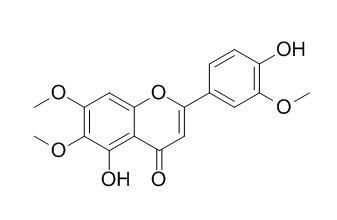Cirsilineol
Cirsilineol may be potentially useful for treating T-cell-mediated human inflammatory bowel diseases. Cirsilineol alsio has anti-proliferative activity against cancer cells by the induction of apoptosis via the mitochondrial pathway.
Inquire / Order:
manager@chemfaces.com
Technical Inquiries:
service@chemfaces.com
Tel:
+86-27-84237783
Fax:
+86-27-84254680
Address:
1 Building, No. 83, CheCheng Rd., Wuhan Economic and Technological Development Zone, Wuhan, Hubei 430056, PRC
Providing storage is as stated on the product vial and the vial is kept tightly sealed, the product can be stored for up to
24 months(2-8C).
Wherever possible, you should prepare and use solutions on the same day. However, if you need to make up stock solutions in advance, we recommend that you store the solution as aliquots in tightly sealed vials at -20C. Generally, these will be useable for up to two weeks. Before use, and prior to opening the vial we recommend that you allow your product to equilibrate to room temperature for at least 1 hour.
Need more advice on solubility, usage and handling? Please email to: service@chemfaces.com
The packaging of the product may have turned upside down during transportation, resulting in the natural compounds adhering to the neck or cap of the vial. take the vial out of its packaging and gently shake to let the compounds fall to the bottom of the vial. for liquid products, centrifuge at 200-500 RPM to gather the liquid at the bottom of the vial. try to avoid loss or contamination during handling.
RSC Adv.2024, 14(40):29319-29329.
Curr Res Virol Sci.2022, 3:100019.
VNU J Science: Med.&Pharm. Sci.2024.2588-1132
BMC Biotechnol.2024, 24(1):94.
Antioxidants (Basel).2020, 9(6):544.
Int J Oncol.2016, 49(4):1497-504
Oncol Rep.2016, 35(3):1356-64
Biomed Pharmacother.2024, 175:116770.
Food and Bioprocess Technology2017, 10(6):1074-1092
Nutrients.2024, 16(15):2518.
Related and Featured Products
Biochem Pharmacol. 2010 Jan 15;79(2):229-38.
Novel immunomodulatory properties of cirsilineol through selective inhibition of IFN-gamma signaling in a murine model of inflammatory bowel disease.[Pubmed:
19698701]
Regulation of signal transducer and activator of transcription (STAT) 1 signaling is being explored as a new approach to the treatment of inflammatory bowel diseases. However, few chemicals have been reported to inhibit IFN-gamma/STAT1 signaling for Crohn's disease therapy.
METHODS AND RESULTS:
In the present study, we found that Cirsilineol, a small natural compound isolated from Artemisia vestita, significantly ameliorated trinitro-benzene sulfonic acid (TNBS)-induced T-cell-mediated experimental colitis in mice, which was closely associated with reduced autoreactive T-cell proliferation and activation. Moreover, the regulatory action of pro-inflammatory and anti-inflammatory cytokine by Cirsilineol treatment was found to decrease the activity of effector Th1 cells but increase the activity of regulatory T cells as characterized by down-regulation of IFN-gamma and corresponding up-regulation of IL-10 and TGF-beta. The therapeutic effect of Cirsilineol was attributable to a novel regulatory mechanism with selective inhibiting IFN-gamma signaling in colonic lamina propria CD4(+) T cells, which was mediated through down-regulating STAT1 activation and T-bet expression. Furthermore, Cirsilineol was found to down-regulate the activation of JAK2, a critical kinase for IFN-gamma/STAT1 signaling, and abrogate the expression of T-bet, resulting in markedly decreased proliferation and activation of T cells in vitro. Importantly, the inhibition of IFN-gamma/STAT1 signaling by Cirsilineol was reversible in the presence of high level of IFN-gamma.
CONCLUSIONS:
These results strongly suggest that Cirsilineol might be potentially useful for treating T-cell-mediated human inflammatory bowel diseases.
J Pharm Pharmacol. 2008 Nov;60(11):1523-9.
Cirsilineol inhibits proliferation of cancer cells by inducing apoptosis via mitochondrial pathway.[Pubmed:
18957174]
Cirsilineol (4',5-dihydroxy-3',6,7-trimethoxyflavone) is a compound isolated from the herb of Artemisia vestita Wall (Compositae).
METHODS AND RESULTS:
In this study, we aimed at examining the anti-proliferative activity of Cirsilineol against multiple types of cancer cells and the underlying mechanisms. Cirsilineol significantly inhibited proliferation of Caov-3, Skov-3, PC3 and Hela cells in a concentration-dependent manner. The compound also dose-dependently induced apoptosis in Caov-3 cells, as determined by annexin V/propidium iodide staining. Besides, Cirsilineol induced a remarkable change in mitochondrial membrane potential and caused release of cytochrome c to cytosol. Furthermore, the compound caused a marked activation of capase-3, caspase-9 and poly (ADP-ribose) polymerase (PARP).
CONCLUSIONS:
These results suggested that the induction of apoptosis via the mitochondrial pathway was involved in the anti-proliferative activity of Cirsilineol against cancer cells.



